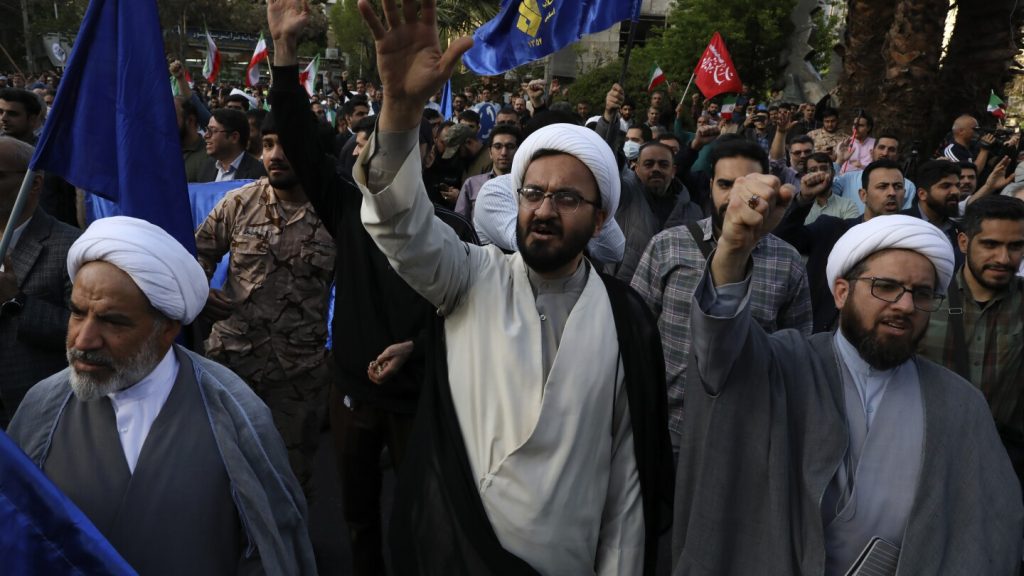World leaders are urging Israel not to retaliate after Iran launched an attack involving hundreds of drones, ballistic missiles, and cruise missiles. British Foreign Secretary David Cameron and French President Emmanuel Macron have both urged Israel to avoid escalating the situation further. The Iranian attack on Israel marked the first direct military assault, despite decades of enmity between the two countries. The attack came less than two weeks after a suspected Israeli strike in Syria that killed two Iranian generals. An Israeli military spokesman stated that 99% of the drones and missiles launched by Iran were intercepted. Iran and Israel have a history of enmity, leading to the recent assault on Israel.
Israel and Iran have been on a collision course due to Israel’s six-month war against Hamas militants in the Gaza Strip. The war began after Hamas and Islamic Jihad, backed by Iran, carried out a devastating cross-border attack that killed 1,200 people in Israel and kidnapped 250 others. The Israeli offensive in Gaza has caused widespread devastation and resulted in the deaths of over 33,700 people, according to local health officials. The recent direct attack by Iran on Israel has upended decades of shadow warfare between the two nations. President Biden hosted the Iraqi leader after Iran’s attack on Israel threw the Middle East into greater uncertainty.
The United Nations Security Council expressed concern about the risk of escalation after Iran’s attack on Israel. The U.N. special envoy for Yemen highlighted the need for broader regional de-escalation, emphasizing the importance of maximum restraint from all parties. The U.N. Security Council emergency meeting ended without any action being taken, with Secretary-General António Guterres calling for defusing and de-escalating the situation. British Prime Minister Rishi Sunak condemned Iran’s attack as a reckless escalation and urged Israel to show restraint. He emphasized the significance of Israel’s security while also advocating for an end to the conflict in Gaza and a deep investment in the two-state solution.
Retired Gen. Frank McKenzie revealed that Iran had approximately 150 ballistic missiles capable of reaching Israel from Iranian territory, most of which were used in the recent attack. McKenzie highlighted the difficulty for Iran to launch an unexpected attack against Israel due to monitoring and detection capabilities in the region. Russia expressed extreme concern about the situation in the Middle East and called for all countries to show restraint. Austria’s foreign minister condemned Tehran’s attack on Israel and urged Iran to rein in its proxies in the region. Oil prices fell after Iran’s strike on Israel was thwarted, as the U.S. and Iran signaled a lack of support for a wider war.
The Israeli military reported four soldiers wounded in an explosion along the border with Lebanon, leading to tensions in the region. Hezbollah claimed responsibility for the explosion, stating it was triggered by mines set up near the border. German Chancellor Olaf Scholz called on Israel to contribute to de-escalation in the Middle East and advised against further military responses to Iran. African governments urged both Israel and Iran to avoid escalating the conflict and emphasized the need for peaceful resolutions. The Gaza Health Ministry reported additional casualties in the ongoing conflict, highlighting the devastating impact on civilians in the region.
In response to the attack, British Foreign Secretary David Cameron urged Israel not to retaliate and to consider a smart approach to the situation. French President Emmanuel Macron described Iran’s attack on Israel as a disproportionate response to previous events in the region. Macron stressed the need to isolate Iran, increase sanctions, and work towards peace in the region. Germany’s foreign minister warned Iran against further escalation and emphasized the importance of diplomatic efforts to prevent regional confrontation. The international community continues to monitor the situation and encourage all parties to show restraint in order to prevent further violence and instability in the Middle East.


